These cities are best prepared for a ‘smart city’ future in 2025
The 2025 Smart City Index represents a fresh approach with enhanced metrics designed to capture the nuances of urban technological advancement better.
The term ‘smart city’ can be interpreted differently depending on its context. For our definition, we have considered the latest available data on technological infrastructure and connectivity, sustainability, and tech-driven jobs for 95 cities.
Some of the benefits of scoring highly on these metrics for local citizens are that they can enjoy better public services, transport, security, economic opportunities, and less air pollution.
Our research
There are many ways to measure a smart city’s performance and proficiency in adapting to evolving digital technologies.
To determine which cities are the smartest in 2025, we analyzed 17 metrics related to connectivity and infrastructure, sustainability, and the tech job market. We then ranked cities in Europe and the United States and created an equally-weighted index.
Metrics considered:
1. Tech infrastructure and connectivity:

- Mobile 5G median download mbps
- Mobile 5G median upload mbps
- Mobile 5G median latency ms
- Mobile 5G median multiserver latency ms
- The number of AI companies
- The number of AI companies per 100,000 people
- The number of IoT (Internet of Things) companies
- The number of IoT (Internet of Things) companies per 100,000 people
- The number of airports
2. Green infrastructure:

- Air quality (exposure to PM2.5)
- 10-year tree loss (hectares)
- 10-year tree gain (hectares)
- The number of electric vehicle charging points
- The number of electric vehicle charging points per 100,000 people
- The number of LEED-certified green buildings
3. Tech job market:
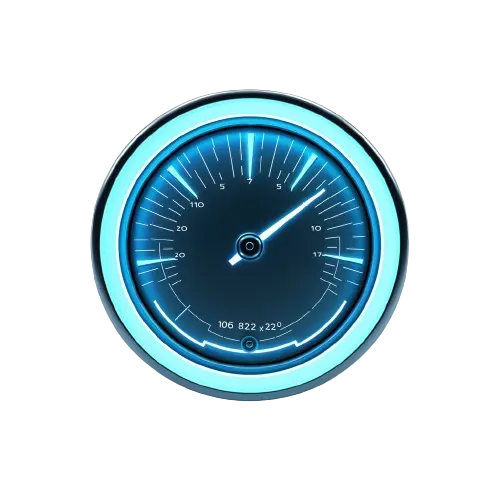
- The number of tech jobs advertised
- The number of tech jobs advertised per 100,000 people
Read on to discover how 95 of the largest cities in the United States and Europe compare
Atlanta ranks as America’s smartest city for 2025
Thanks to its smart tech infrastructure (scoring 88 out of 100) and healthy tech job market (82 out of 100), the Georgia city of Atlanta now ranks as America’s smartest city — ahead of tech powerhouses Boston and San Francisco.
Atlanta has the fourth-highest internet download and upload speeds of any major U.S. city. Relative to its population size, Atlanta also boasts the third-highest number of companies dedicated to the Internet of Things (IoT) and the fifth-highest number of artificial intelligence (AI) companies.
Atlanta is also a prime spot for anyone seeking employment in the tech sector, with 643 tech jobs advertised per 10,000 people — the seventh-highest rate of tech job ads in America.
It may be surprising to see the tech hub of San Jose in 10th place, however, its overall smart city credentials remain strong. The Californian city has one of the highest densities and total counts of electric vehicle (EV) charging stations in the United States, along with having the sixth-highest number of companies dedicated to IoT.
The U.S. cities best prepared for a smart city future
The following U.S. cities are the best prepared for a smart city future, scored out of 100 and based on 17 metrics related to tech infrastructure and connectivity, sustainability, and the tech job market.
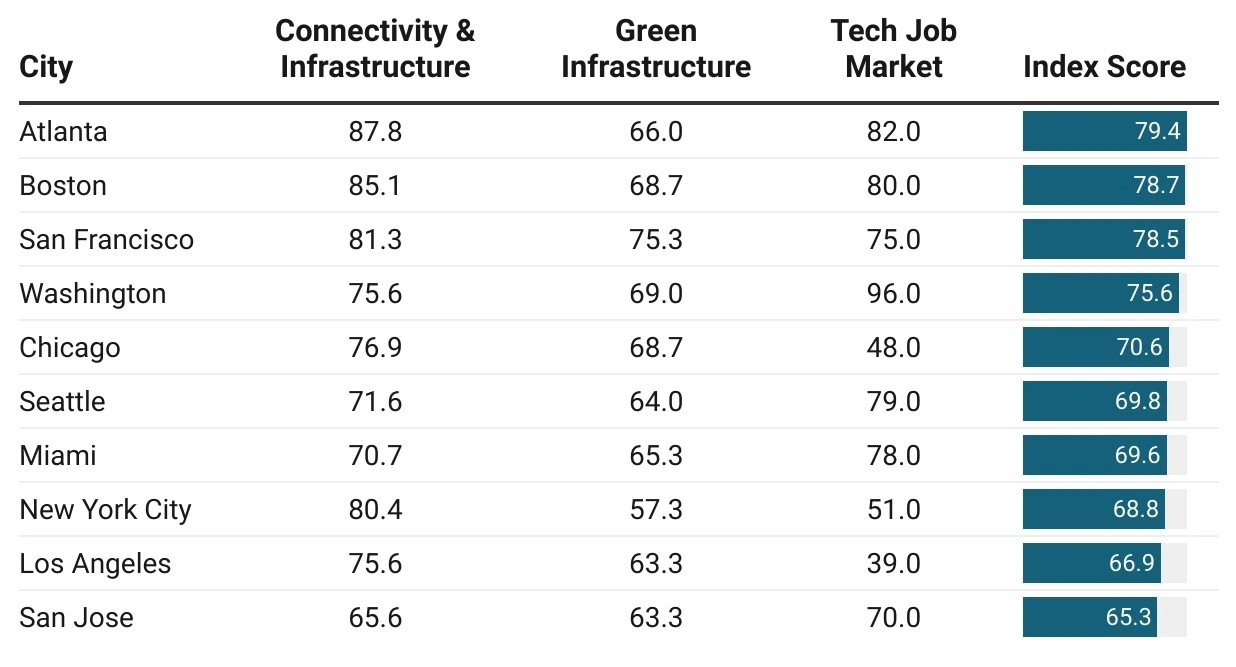
Atlanta’s tech infrastructure and connectivity rank highest in the United States
While Atlanta steals the top spot for its superior performance in the technology infrastructure and connectivity category, Boston is also performing well in this area for 2025.
The Massachusetts city has the third-highest rate of AI companies in the U.S. (384 per 100,000 people) and the fifth-highest overall number of AI companies.
At the end of 2024, Governor Maura Healey announced the launch of the Massachusetts AI Hub, which is described as a groundbreaking plan to make Massachusetts a national leader in artificial intelligence innovation.
Elsewhere in the top 10 best cities for tech infrastructure and connectivity is Seattle. What was once a blue-collar city is now a widely recognised tech hub, with companies like Amazon and Microsoft containing campuses there. Seattle is in the top 6 U.S. cities for having the most IoT companies and AI companies per 100,000 local residents.
The smartest U.S. cities for connectivity and infrastructure
The following U.S. cities have the best smart city infrastructure, based on nine metrics related to internet connectivity, the presence of innovative companies within AI and the Internet of Things, and technological infrastructure.
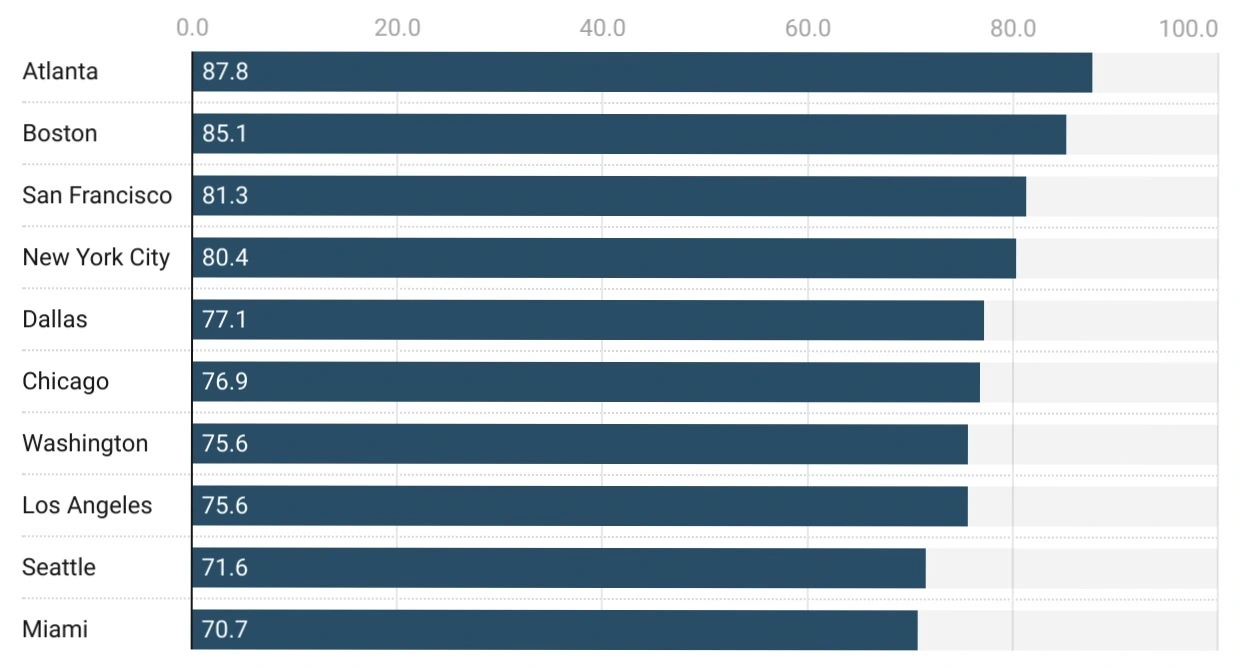
San Francisco’s green credentials rank highest among major U.S. cities
The Californian city of San Francisco ranks as the best in the U.S. on combined environmental metrics — it is the eighth highest ranking for both its number of EV charging stations and highest density of charging stations.
San Francisco also has the eighth-highest number of LEED-certified (Leadership in Energy and Environmental Design) green buildings (1,510), the world’s most widely used green building rating system by USGBC.
Washington, D.C., closely follows San Francisco in second place, with a green score of 73 out of 100. Washington contains more LEED-certified buildings (3,065) than any other U.S. city in our analysis and more than double that of San Francisco.
Washington also scores well on protecting its trees compared to other cities, with the equivalent of 62 hectares lost between 2001 to 2023 (Global Forest Watch). This is the fifth lowest amount of any other major U.S. city.
The smartest U.S. cities for green infrastructure
The following U.S. cities rank the highest for sustainability, based on six metrics related to air pollution, tree coverage, green building certification, and electric vehicle charging infrastructure.
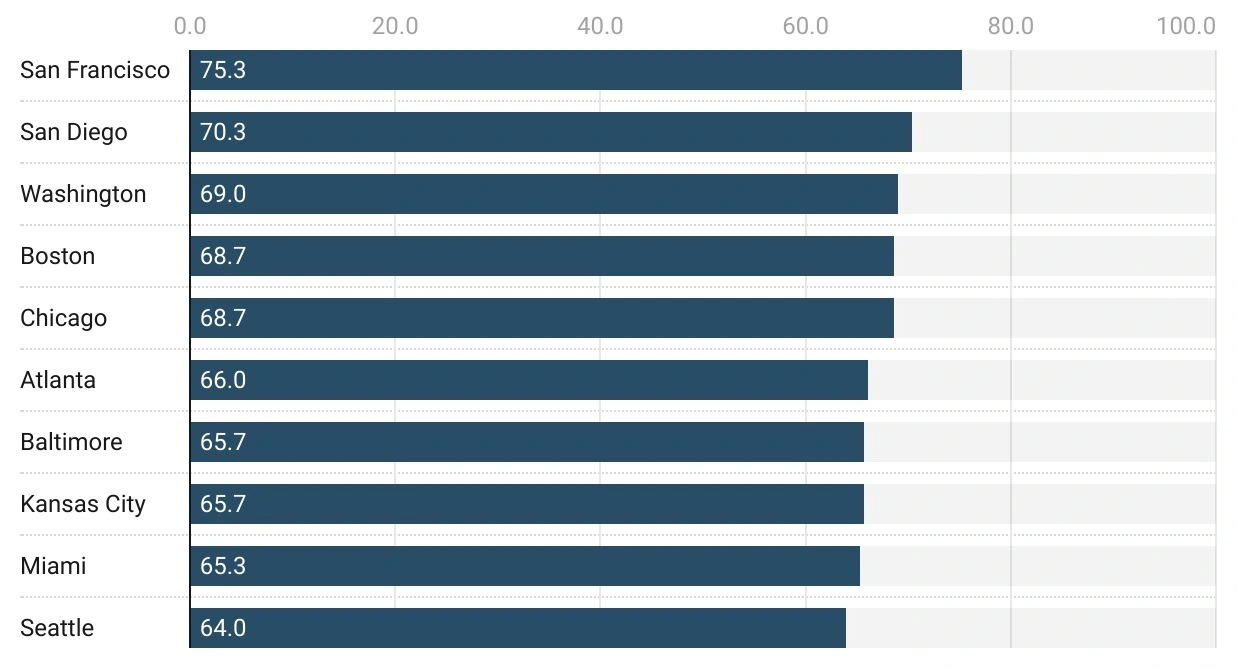
Oakland, California emerges as America’s best hub for tech jobs
Oakland outperforms all of its neighbouring Californian cities this year for offering the greatest choice of tech jobs relative to its population size — scoring 98 out of 100 overall in the tech jobs category.
Oakland is the largest and most established of the East Bay cities. However, within our analysis, it contains one of the smallest resident populations while its rate of tech jobs is an impressive 889 per 10,000 people. That’s enough jobs to cover the equivalent of 10% of its population.
It’s important to note that job availability doesn’t guarantee open positions are being filled within a healthy economy. In January 2025, the San Francisco Chronicle also reported that San Francisco, Oakland, and San Jose metropolitan areas all saw significant declines in economic performance compared to the previous year.
The U.S. cities with the best tech job market
Based on the number of tech job postings and job postings per 100,000 residents.
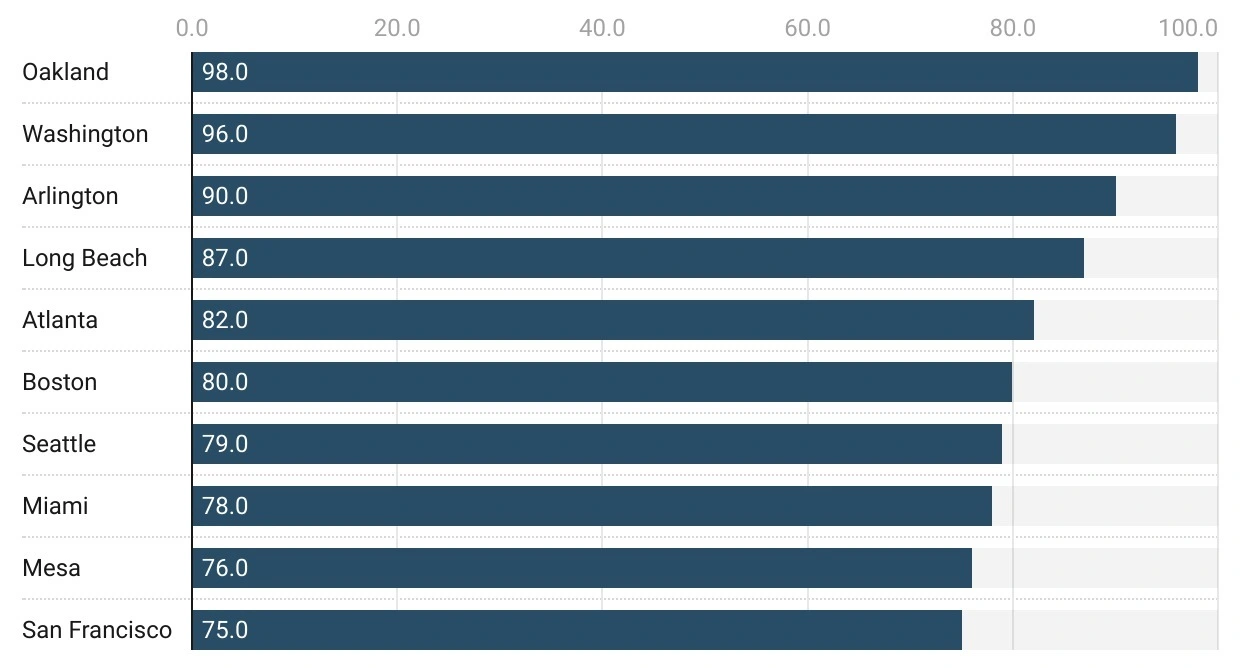
Paris is Europe’s smartest city for a second year in a row
With consistently high scores across all three core categories of our index, Paris is once again the smartest city in Europe.
Within the tech infrastructure and connectivity category, Paris scores 79 out of 100, with only Stockholm and Oslo ranking higher. The French capital has the second-highest number of IoT companies (148) and the second-highest number of AI companies (666) headquartered there.
Stockholm, home of ProptechOS, earns its position among Europe’s smartest cities with impressive technological infrastructure. In our analysis, the Swedish capital boasts the highest upload speed of any European city at 42 megabytes per second and the sixth-highest download speed (283mbps), demonstrating its exceptional digital connectivity (5G data by Ookla).
London continues to demonstrate remarkable technological leadership in 2025. The British capital boasts the most companies in Europe dedicated to AI (2,233) and the Internet of Things (483), cementing its status as a major hub for cutting-edge technology development.
The European cities best prepared for a smart city future
The following European cities are the best prepared for a smart city future, scored out of 100 and based on 17 metrics related to tech infrastructure and connectivity, sustainability, and the tech job market.
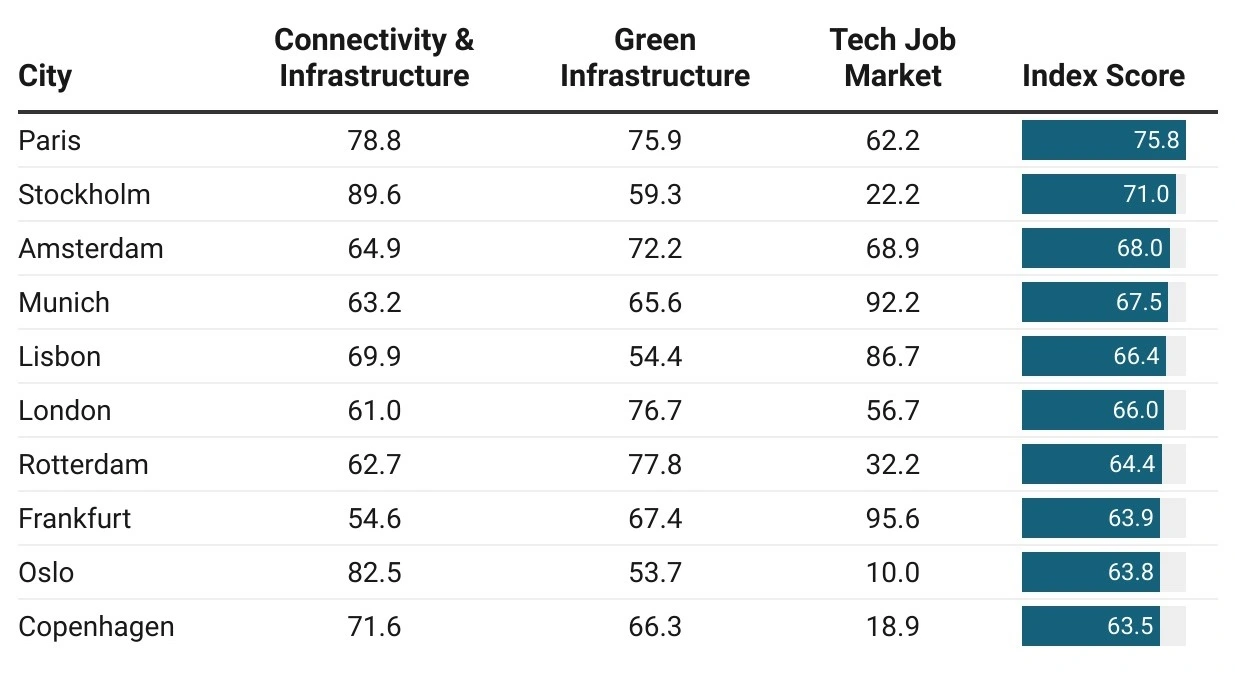
Stockholm has Europe’s smartest tech infrastructure and connectivity in 2025
In addition to its superior internet speeds, Stockholm’s ranking of first place for tech infrastructure and connectivity is also due to steady performances in its rate of AI companies per 100,000 people (13) and its excellent airport access.
Breaking into this year’s 10 best smart cities for tech infrastructure and connectivity is Tallinn. Estonia’s capital ranks highest in Europe for the number of AI companies located there compared to its population size (39 per 100,000). At the same time, it also ranks second for its rate of IoT companies (9 per 100,000).
A surprising omission from the top 10 is London, which is let down by having some of the worst 5G internet speeds among major European cities.
The smartest European cities for connectivity and infrastructure
The following European cities have the best smart city infrastructure, based on nine metrics related to internet connectivity, the presence of innovative companies within AI and the Internet of Things, and technological infrastructure.
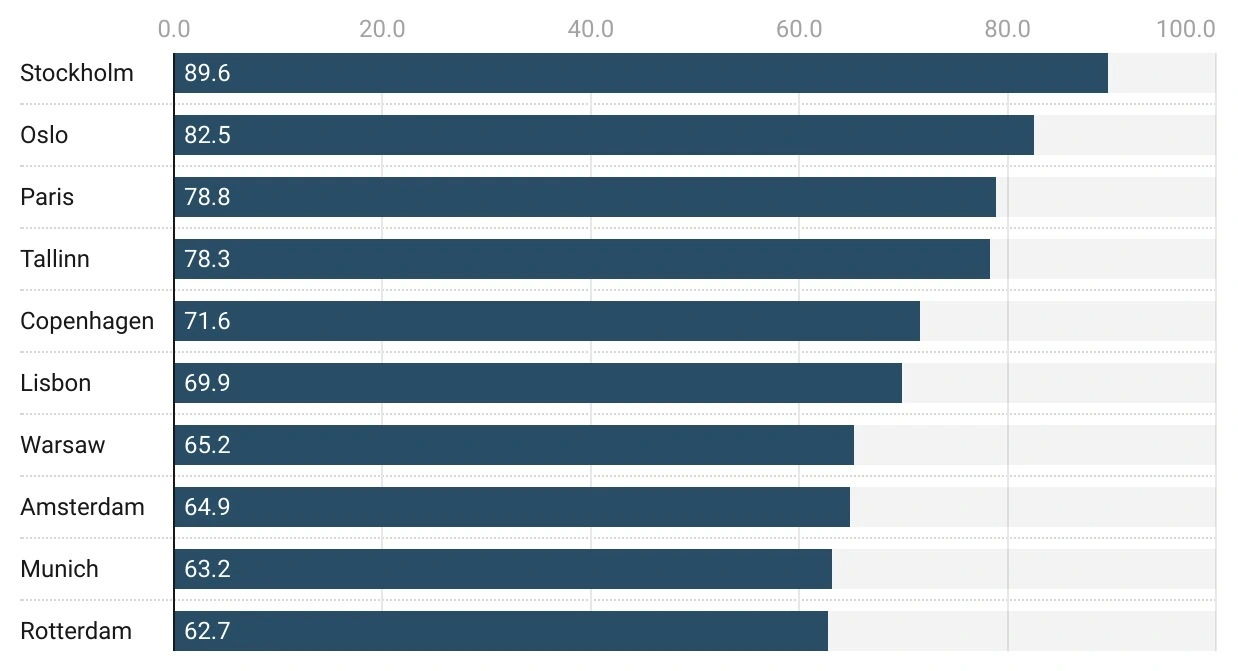
Rotterdam is Europe’s smartest city for sustainability
Rotterdam has emerged this year ahead of its fellow Dutch city Amsterdam to be named Europe’s best smart city for sustainability.
Ranking second behind Amsterdam on its rate of EV chargers per 100,000 people (73), it is also the fifth-best city for its level of air pollution. Its tree loss over more than two decades is the 11th lowest for any European city analysed — equivalent to 76 hectares – while it has created an additional 333 hectares of tree coverage over a similar period.
Second-placed Paris also performs exceptionally well on keeping its tree loss to a minimum – losing just 9 hectares since 2001, while adding more than 220 hectares in a boost to the city’s longer-term green credentials.
The smartest European cities for green infrastructure
The following European cities rank the highest for sustainability, based on six metrics related to air pollution, tree coverage, green building certification, and electric vehicle charging infrastructure.
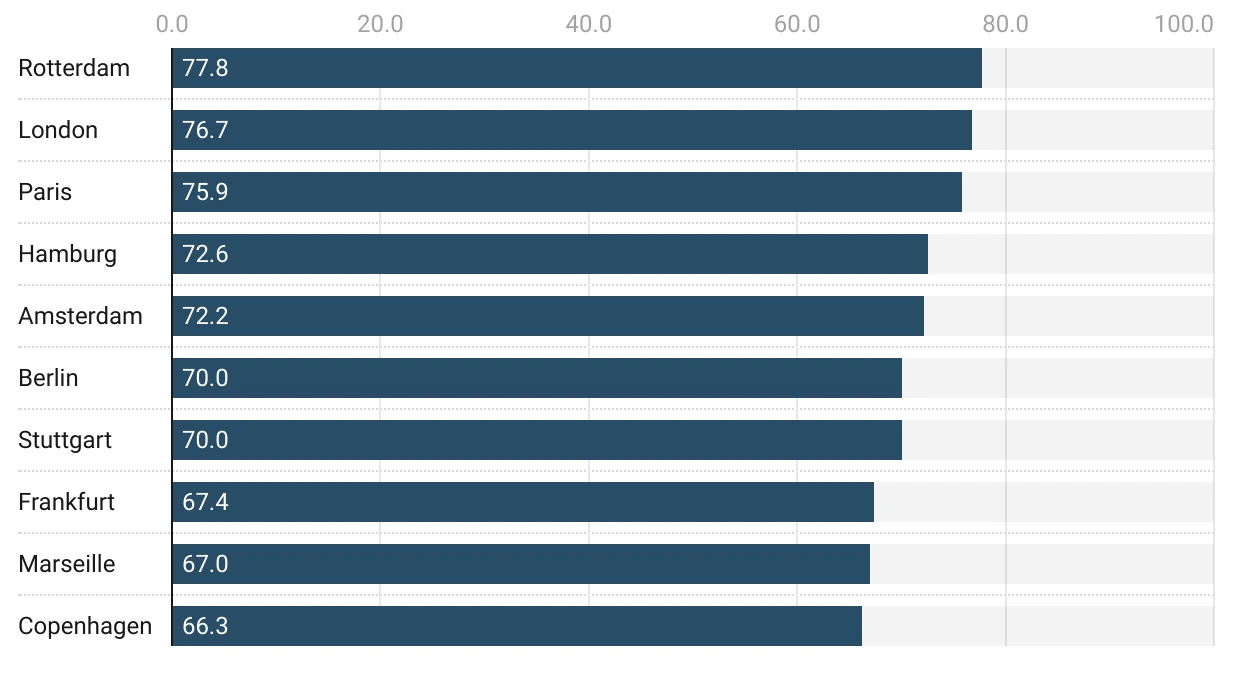
German cities dominate the European tech job market
While five of the six top-ranking cities for tech jobs are based in Germany, this year’s winner is the historic city of Cologne.
There are 16,166 tech jobs advertised in the city, equivalent to 168 per 100,000 residents. In recent years, it has been credited with having the third-highest startup density in Germany after Berlin and Munich and a tech ecosystem that doubled in value on either side of the COVID pandemic.
Frankfurt edges out Cologne on its relative number of tech jobs but also ranks further behind it and other larger cities like London, Berlin, and Munich on its overall number of job openings in this sector.
The Polish city of Wroclaw also enters this year’s top 10 ranking of tech job hubs in Europe. Its 91 tech jobs per 100,000 people are the eighth highest in Smart City Index 2025.
While Poland already commands a strong reputation in the tech sector, Wroclaw alone boasts a strong academic centre and the country’s largest number of research and development units of domestic and global companies.
The European cities with the best tech job market
The following European cities have the best tech job market, based on the number of tech job postings and the number of tech job postings per 100,000 people in each city.
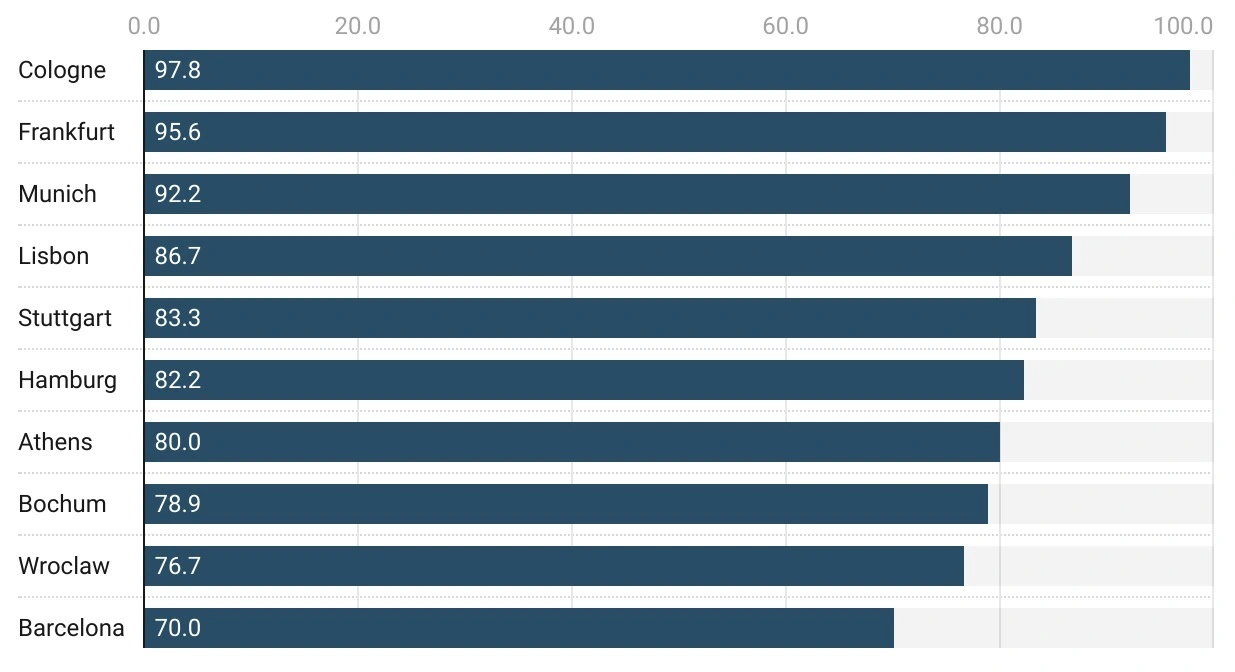
Methodology
To assess the smartest cities in the United States and Europe for 2025, we analyzed 17 equally-weighted metrics across three categories: connectivity and infrastructure, sustainability, and the local tech job market. Our criteria align with the OECD’s guidelines for smart cities.
This year, ProptechOS has partnered with Ookla to incorporate their Speedtest Intelligence data, providing high-quality Mobile 5G performance metrics, including download, upload, and latency speeds. This collaboration has significantly enhanced our connectivity assessment with median annual measurements from 2024, drawn from a sample size in the millions.
Our 2025 study has expanded to encompass 95 cities, including the 50 largest cities by population in the United States and 45 major cities across Europe, all with comparable data.
This represents a substantial increase in coverage from previous editions.
It’s important to note that this year’s index features several methodological enhancements, including refined metrics and expanded data sources. Thus, the 2025 results are a standalone assessment rather than a continuation of previous indexes. These improvements allow for a more accurate and comprehensive evaluation of smart city development.
Each metric was standardized and scored on a scale of 0 to 100 to ensure comparability across different data points. The analysis was conducted in March 2025.
Find our previous editions here:
Smart City Index 2023
Smart City Index 2024
For questions or queries, contact:
Anna Lundvall-Hedin
Marketing Manager
[email protected]